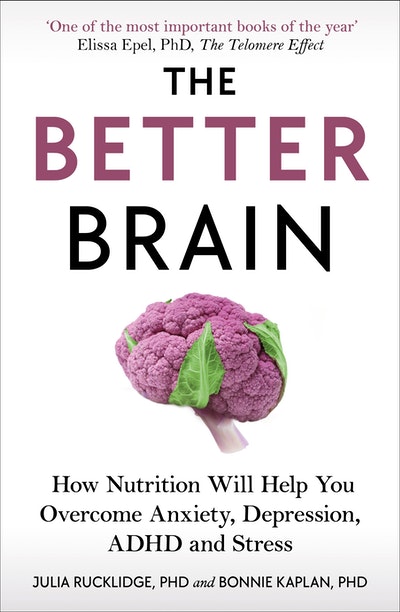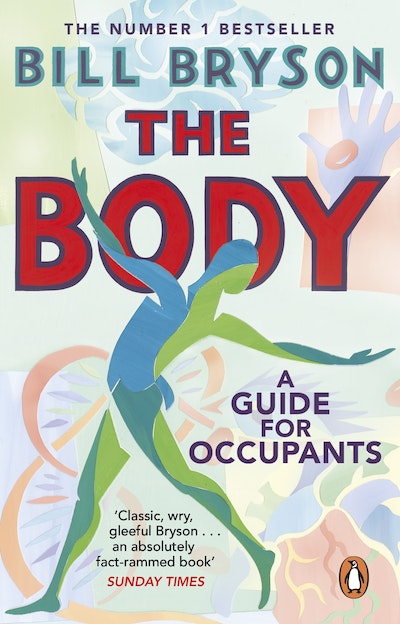- Published: 13 April 2021
- ISBN: 9781785043567
- Imprint: Vermilion
- Format: Trade Paperback
- Pages: 368
- RRP: $40.00
The Better Brain
How Nutrition Will Help You Overcome Anxiety, Depression, ADHD and Stress
Extract
How to Use This Book
Part I, A Bold New Paradigm for Improving Mental Health, describesthe basics of what nutrients do in your brain. Like almost all scientists,we also struggled with the concept of nutritional treatment of mentaldisorders when we first began our research, but once we engaged withthe science, we realized that this kind of approach has amazing potential. We now know that some people may have underlying risk factors,perhaps genetic, that lead them to be more vulnerable to emotional distress when their diet is poor. Part I also discusses the importance ofthe microbiomes in your gut and in the soil, and how the gut and brainare surprisingly intertwined.
Part II, Better Nutrition for a Better Brain, presents many studies that have proven that nutrients really do make a difference in mental health. For example:
- In three randomized clinical trials of adults with depression and poor eating habits, education about how to improve their diet led to dramatic improvements in their mood in a matter of weeks.In many cases, complete remission of depression was achieved —they were no longer depressed at all.
- In one study on adults with ADHD, published in the British Journal of Psychiatry in April 2014, after only eight weeks, twice as many responded in the high dose multinutrient group compared to the placebo group; twice as many went into remission in their depression; hyperactivity and impulsivity dropped into the normal range; and ADHD symptoms were less intrusive. Even better, at the one year follow up, those who stayed on micronutrients maintained their improvements or showed fewer symptoms compared to those who stopped or switched to medications and saw their symptoms get worse. They were also more likely to go into remission at follow upon the nutrients. And these short and long term findings have recently been replicated in a study conducted with children with ADHD.
- In two studies, one with 358 adults with bipolar symptoms and the second with 120 children with bipolar symptoms, micronutrients reduced symptoms on average by 50 percent, and this was sustained for six months with a simultaneous reduction in the use of medications.
- Nutrients given to survivors after natural disasters or traumatic events are proof that a well-nourished body and brain are better able to recover from major stress events. Even after a year, people who received the nutrients did better than those who didn’t.
- Every clinical trial using broad-spectrum multinutrients to treat people who have psychiatric symptoms has shown positive results.The research has reported that approximately 80 percent of people experience some benefit from treatment, with about 50 percent being much to very much improved when taking the multinutrient formulas. That’s how powerful this treatment is.
In Part III, How to Feed Your Brain, you’ll learn why it’s time to stop putting the whole world on pills. Looking at any class of psychiatric drugs, whether they’re antidepressants, antipsychotics, or anti-anxiety medications, the pattern is the same. In the short term, these drugs are often very effective, with some people experiencing dramatic improvement in their psychiatric symptoms. But in the long term, too often, they aren’t. And in some cases, they make life much worse for those who take them.
Although medications may help reduce many symptoms, they often don’t restore people to normal mental health. There must be a better way. And there is. Instead of pharmaceuticals, good nutrition is an essential part of recovery and continued healthy brain function.
You don’t need us to tell you about the typical Western diet. You already know that it’s high in calories, refined grains, and sugar; it’s heavily processed; and it’s low in fresh produce, especially vegetables. In contrast, a healthy, Mediterranean-style diet is high in fresh vegetables and fruits, nuts, good fats, and fish. It’s low in ultra-processed foods and sugary drinks. And here is the scary fact — government data from the United States, Canada, New Zealand, and Australia show that at least 50 percent of what we now put into our mouths does not even qualify as food. It is ultra-processed “stuff .” Stuff made from simple carbs (sugar), salt, trans fats, and chemicals like artificial colouring.
Food is defined as nutritious substances we consume for growth and to maintain life. There has not been a single study showing that the Western diet is good for our mental health. Those who eat a Mediterranean diet, on the other hand, have lower rates of depression than those who eat Western diets.
Our food supply is also a factor in our decreased nutrient intake. Climate change, increasing levels of carbon dioxide in the atmosphere, and poor soil quality lower the nutrient density of what we eat, which means that the apple you eat today doesn’t have the same nutrients as one eaten a generation or two ago. So we need to improve our soil, in order to grow and eat healthier food.
These chapters will show you how to rethink your food choices, give your store cupboard the makeover it needs, and make shopping and cooking a breeze. The food plans and recipes make this even easier —and delicious.
In Part III we will also tell you about the supplements that have been studied, whether you need to do blood testing beforehand, and any side effects you need to be concerned about if you decide to use supplements.
We want this book to be the tipping point for revolutionizing the way mental health problems are treated. Not only will this book show you how to take prevention seriously by optimizing your nutrient intake, but it will give you the information you need so that you can have informed discussions with all your healthcare providers about options that might really work for you
This book will put the critical knowledge in your hands, and it will empower you to improve not only your life but the lives of your loved ones.
Making this happen is why we wrote this book. To work toward a more successful treatment approach, one that is more affordable and accessible to the millions of people who need it.
When people realize what nutrients do inside their brains, they are more likely to change the way they eat. People get better not just in terms of mental health symptoms — their sleep improves; their moods improve; their need for addictive drugs like cigarettes, marijuana, and alcohol goes down; and they find it much easier to cope with life’s daily stresses.
We can do better if we learn how to care for our brains through nutrition. Change is long overdue. And no prescription is needed!
The Better Brain Bonnie J Kaplan, Julia J Rucklidge
The key to treating mental illness is in your kitchen, not the pharmacy
Buy now











